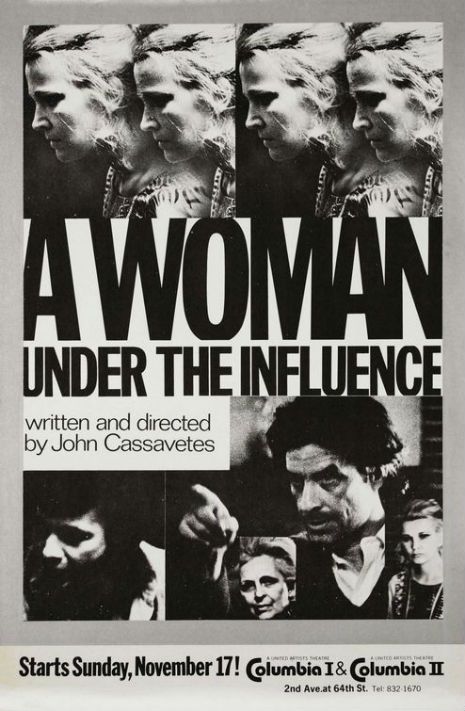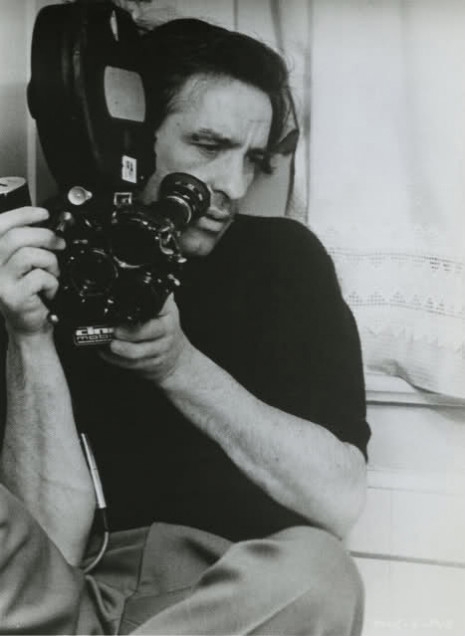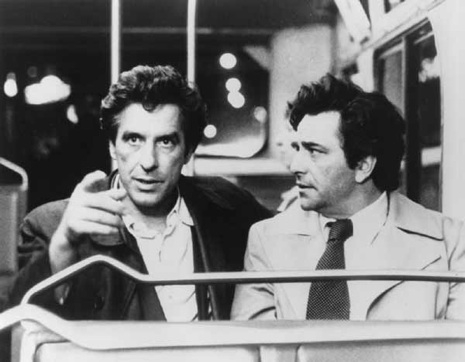
Unrelenting. That is one of the first words that comes to mind when talking about the work of John Cassavetes. Few filmmakers were as willing to not only open a vein but then deny their audience any easy answers about said act as Cassavetes. A Woman Under the Influence is a supreme example of this, standing as one of the most honest and quietly uneasy films that have emerged in the past fifty years. How uneasy? Well, it made Richard Dreyfuss physically ill after watching it…..in a good way. (Yes, even vomiting can be a compliment when done correctly.) That reaction sounds completely over dramatic, but when you see the film, you can understand why Dreyfuss or anyone else, would have been so gut punched by it.
Woman stars Gena Rowlands as Mabel, a middle-aged mother of three precocious kids and wife to Nick (Peter Falk), who is a gruff but warm blue collar man. She seems high-strung at first, but it quickly becomes apparent that there is something not right. Everyone knows it except her husband, with even some of his co-workers asking about her health. Nick’s the kind of guy who lives in denial for the reasons most due in such situations; out of love and out of an inability to deal. But much like in real life, it takes a series of events to bring everything to a simmer and after one particularly ugly and intense intervention with Mabel, her doctor and Nick’s stunningly irritating mother, he has his wife committed.
It is in her absence that he is confronted with the fact that he is not only been out of touch with his wife, but with his children as well. The only time we get to see him bond with the kids at all, is when he gets them unwittingly snockered on cheap beer after a dreary trip to the beach. Two months later and Nick plans a huge welcome back party for Mabel, but then quickly scraps it in favor of a more intimate family gathering. But as she arrives home, looking heavily sedated bordering on shell shocked, it becomes apparent that there are no easy fixes, especially for a family that is so steeped in simply not dealing.
Woman Under the Influence is a film that not only confronts its characters’ issues but a larger issue looming ahead. Mental illness, along with addiction, are two of the most misunderstood and often mishandled issues. It’s true now and it was true then, especially when you are talking about a time when electroshock therapy was common, a procedure Mabel mentions receiving. There’s nothing like someone leaving a facility worse off than they were beforehand. (For more info on this, just listen to Lou Reed’s song “Kill Your Sons”, which references Reed’s own experiences with electroshock.) Often, families’ ways of dealing with mental illness is to not deal with it all until it becomes the loud and at times, dangerous elephant in the room. Even then, there is an undercurrent of resentment there, something that comes out especially from Nick’s mother, making an already dicey situation worse when her son is finally trying to help Mabel.
Even Nick, who clearly does love his wife, is still impotent in his ability to even truly empathize with his spouse, including slapping her around a few times to calm her down. He’s not a villain just someone who is rendered useless by his unwillingness to try to understand, but also by the fact that he was never raised to see his partner as a full fleshed human being and an equal. It doesn’t take much reading between the lines to see that gender roles have hurt Nick and Mabel. In one scene, she tells her kids that “I never did anything in my whole life than make you guys.” She’s not trying to make them feel bad or anything, but it is a loaded statement because it’s clear that she has been relegated her whole life to the categories of “wife,” “mother” or “daughter.” There is nothing wrong with any of those categories, but every person is more than just a label put on them. The whole being gets neglected, along with any troubles they may have. This applies to Nick too, because men often get a whole other set of baggage to deal with, so you end up with a whole generation of individuals who are not equipped to fully deal with one another.
Cassavetes handles all of this brilliantly, which is no shock for anyone familiar with the man’s work. It would have been the easiest thing in the world to simplify everything. Have Nick be a total bastard or pure doting husband and Mabel just be a misunderstood eccentric or a total psychopath. Not to mention the last 20 minutes, which mirrors Cassavetes equally sublime Killing of a Chinese Bookie, both in terms of open-endedness but even with the main character’s blood on their own hand. (The latter may or may not have been on purpose, but it’s interesting nonetheless.) It’s that gray-area borderland of no easy answers that permeates this film, making it all the more uncomfortable but all the more honest. Cassavetes is a director that not only loves his work enough to be real but his audience as well. This is an artist that respects you enough to never bullshit you. That alone makes me a fan for life.
The acting in Woman, especially where our two leads are concerned, is flawless. Watching Gena Rowlands and Peter Falk together is one blue spark of a gift, with the both of them being equally compelling and heartbreaking. In fact, Rowlands won the Golden Globe for best actress and was nominated for an Academy Award for her work in this film. But enough praise cannot be heaped upon Falk, who’s at his zenith here. While most are familiar with him as TV’s lovable Columbo, Falk was a red blooded actor’s actor. How many can boast about not only working with Cassavetes but also Wim Wenders (Wings of Desire) to boot? Not many, but Falk was a special breed of character actor and it’s hard to think of someone who could pull off a guy like Nick, who is both likable, sympathetic and at times, a total ass.
Woman is an incredibly uncompromising work that at times is too close for comfort, but in a way that is needed. There’s a truth to this film that has not faded with age. Illnesses get ignored, families repeat dysfunctional patterns and miscommunication is bred in a hothouse of forced gender roles for all involved.
Luckily for us, the British Film Institute (BFI) have done a wonderful job of presenting this film, both on DVD and Blu Ray, for European viewers or anyone who happens to have a Region 2 (PAL) player. (Never fear, North Americans, for Criterion’s Region 1 release of it is still in print and also available as a part of their John Cassavetes Five Films box set.) This is a loving release, with a 30 page booklet, the original trailer as well an alternative one that features footage which is not in the final cut, an archived interview with Peter Falk and an interview with Elaine Kogan, Cassavetes’ long term personal assistant. It’s a supremely fine release and a great tribute to the man and his work.
A Woman Under the Influence is brilliant and like many a great piece of art, it may bristle and worm its way in your skin. It’s a near flawless film that gives you no easy answers because it does not and will not play you for a fool. (Though do try to ignore the awful bit of weird Dixieland music that pops up at the very end. Not sure what that was about but it’s a minor quibble.)







